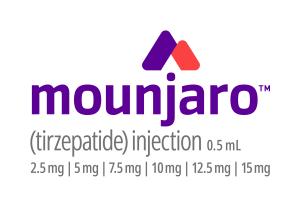Over the last couple of years there has been a huge increase in people using injectable medications for weight loss treatment. Because of the limited availability on the NHS for people who are not diabetic much of this is privately sourced. There are around half a million users in the UK.
The main medications available are Tirzepatide (the brand name is Mounjaro) and Semaglutide (the brand names are Ozempic and Wegovy).
All these medications are called GLP-1 injections and they work by mimicking a naturally occurring hormone, glucagon-like peptide-1 (GLP-1), to help regulate blood sugar and promote weight loss. They achieve this by causing lots of changes in the body including increasing insulin production, reducing glucose production in the liver, and slowing down food digestion, leading to a feeling of fullness and reduced appetite.
They are very effective weight loss mediations when you are taking them, but on stopping them over a few weeks the effects diminish, appetite returns and most people regain a substantial proportion of the weight lost over the following months unless they have simultaneously managed to make dietary and lifestyle changes.
On the whole the data we have at present indicates these are relatively safe medications. The main side effects are gastric with people feeling sick, vomiting, being constipated or having diarrhoea and experiencing abdominal discomfort and increased flatulence. Other common side effects are tiredness, dizziness and hair loss.
There are some people who should NOT take GLP-1 injections for example people with significant gastrointestinal diseases, anyone who has had pancreatitis before, or anyone who is pregnant and breastfeeding.
There is no little data about the safety of these medications in pregnancy and it is advised that if you are using these injections you should be using an effective form of contraception and continue this for up to 3 months after stopping them.
As a GP with a special interest in women’s health I’m aware there are 2 groups of people who may be using GLP-1 injections and could run into problems:
Women of childbearing age – Mounjaro (but it seems not ozemipic or wegovy) has a significant impact on how well the body can absorb the contraceptive pill – both the combined pill, and the progesterone only pill. This can decrease the effectiveness of the pill and put women at risk of unplanned pregnancy. If you are using pills for contraception you should be using extra precautions for a month after you start Mounjaro AND for a month after any dose increase. Contraceptives like implants or coils are not affected and are safe to use. If you are taking the pill and do not want to use barrier contraception perhaps consider changing to a more effective contraceptive method before starting the injections. This is a very good information leaflet that covers lots of issues to do with GLP-1 injections and contraceptive pills: https://www.fsrh.org/Common/Uploaded%20files/documents/Patient-information-GLP-1-agonists-and-contraception.pdf
Postmenopausal women on HRT – it’s thought that all GLP-1 injections, but likely especially Mounjaro, can impact the absorption of HRT taken by mouth. So for those taking oral oestrogen the injections could cause your menopausal symptoms to increase. More concerning is if you are using an oestrogen through the skin via a patch, spray or gel AND oral micronised progesterone (utrogestan) tablets. If you have the normal amount of oestrogen but too little progesterone the lining of the womb is not adequately protected and this can cause bleeding and increase the risk of endometrial cancer. If you are on HRT with oral progesterone, before you start the GLP-1 injections, please discuss with your GP the options of either increasing your oral progesterone or change to a progesterone mixed in to the patch or via a coil. If you do have increasing or unexpected bleeding on your HRT preparation please discuss with your GP.
Dr Jo Coldron (GP Partner)
Tavyside Heatlh Centre

